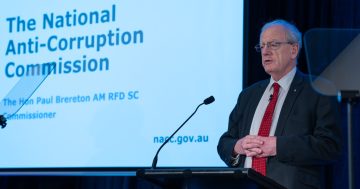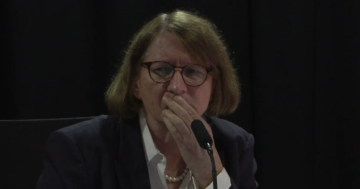
Former NDIA & Services Australia Minister Stuart Robert at the Robodebt Royal Commission. Photo: Screenshot.
A parliamentary committee looking into Services Australia and the National Disability Insurance Agency (NDIA) and their procurement practices has recommended former minister Stuart Robert be referred to the National Anti-Corruption Commission (NACC).
The recommendation was made in an interim report by the Joint Committee of Public Accounts and Audit (JCPAA) released on 8 September. The terms of reference for the inquiry were to report on the procurement matters at Services Australia and the NDIA following the Watt Review, and the conduct of entities or persons involved in those activities, including issues of culture and probity.
The Watt Review found that $374 million in contracts deemed to be poor value for money with perceived conflicts of interest were awarded, and that Mr Robert had been closely linked to Synergy 360, a consultancy firm which assisted companies to secure government contracts.
The JCPAA’s interim report stated that while the Watt Review was limited in scope to the conduct of Australian Public Service staff, the committee was empowered to conduct investigations into “the conduct of all parties involved in the relevant procurements, including ministers, lobbyists, consultants, and vendors”.
The report stated concerning evidence was received which raised “serious allegations and questions about financial impropriety, improper relationships and undisclosed conflicts of interest with parties receiving contracts from the Commonwealth”.
It stated some matters raised in the allegations were established in public hearings and corroborated by other evidence, though many remain unresolved.
“Previously undisclosed meetings were revealed between former Minister Stuart Robert, Synergy 360 and Infosys including during a tender process, and when Infosys was being performance managed by Services Australia,” committee chair Julian Hill MP said in the report’s foreword.
“There is no evidence of probity advisors or public servants being present at 11 meetings, no contemporaneous notes or records of what was discussed made available, no apparent declaration of any conflicts of interest being made, and no evidence that other bidders or vendors unrelated to Synergy 360 were accorded similar treatment or access.
“These matters are of concern and may be considered further in the committee’s final report.”
Mr Robert has denied any improper conduct, as have Queensland Liberal National Party fundraiser John Margerison and Synergy 360 principal David Milo. Mr Margerison was reported in July to have “severed all ties” to Australia and is now living overseas.
Mr Hill said, despite the reports of improper conduct, the committee was not provided with direct evidence of financial liabilities owed or payments occurring from Synergy 360 to the Australian Property Trust or other entities to the benefit of Mr Robert, despite multiple requests being made for documents and witnesses failing to respond to questions in full.
“The evidence before this inquiry in relation to these issues is therefore both directly conflicting and mutually incompatible,” he said. “In these circumstances, this committee is not able, given the resources available to it including a lack of forensic accounting expertise, to make clear findings in relation to the truth or otherwise of the allegations raised.
“The committee therefore considers that, in light of the serious and systemic nature of the allegations, an agency with compulsory questioning and document gathering and investigatory powers should take up the matter so that these questions may be properly assessed.”
Mr Hill said a referral to the National Anti-Corruption Commission by a parliamentary committee should never be made lightly. “In these circumstances, however, there appears no other appropriate course of action.”
The interim reports stressed: “In making this recommendation the committee is not making any findings in relation to the conduct of any individuals.”
Original Article published by Andrew McLaughlin on Riotact.










